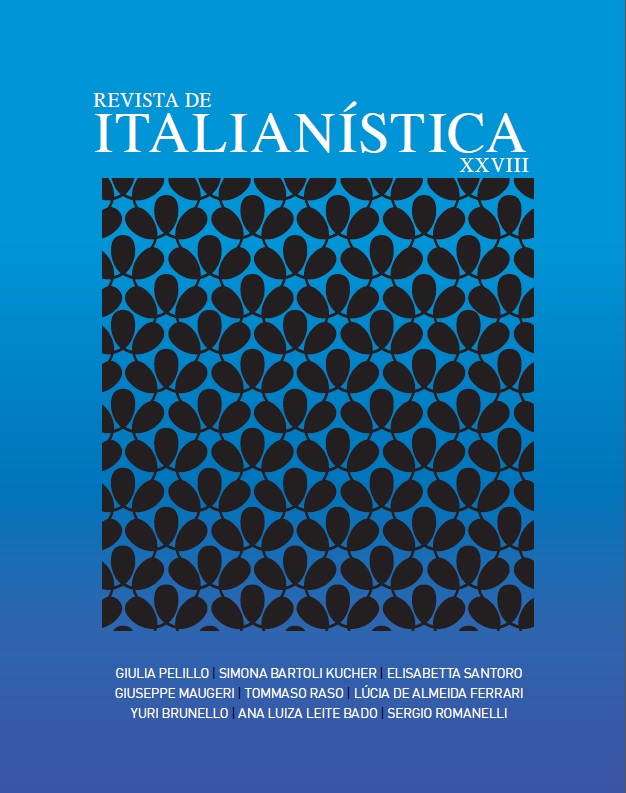Valence and resource of learning environments in the language teaching process
DOI:
https://doi.org/10.11606/issn.2238-8281.v0i28p55-86Keywords:
Environmental Psychology, Action Research, Learning Environments, Spatial Organization, Ergonomic ComfortAbstract
Can learning environments be designed to enhance the learning strategies of the students? Can the teaching space have an impact on the study experience of adult learners and, thus, influence their motivation and performance? These are some of the questions which we will seek to answer in a didactic planning that requires an analytical project, including the experience of learning environments as a strategic element both to strengthen the process of communication between organization-teacher-students, and for students’ learning.
Downloads
References
ALVESSON, M. Prospettive culturali per l’organizzazione. Roma: Guerini & Associati, 1996.
ARGANO, L.; DALLA SEGA, P. Le nuove organizzazioni culturali. Milano: Franco Angeli, 2009.
AUGÈ, M. Non-luoghi. Milano: Eleuthera, 2005.
BALBONI, P. Conoscenze, verità, etica nell’educazione linguistica. Torino: UTET, 2012.
BALBONI, P. Elementi di Glottodidattica. Brescia: La Scuola, 1985.
BALBONI, P. Fare educazione linguistica. Torino: UTET, 2008.
BALBONI, P. Il ruolo delle emozioni di studente e insegnante nel processo di apprendimento e insegnamento linguistico. EL.LE, 2013, 2, 1. Disponibile in: <http://virgo.unive.it/ecf-workflow/upload_pdf/ELLE_4_1.pdf>. Accesso: 21.09.2014.
BALBONI, P. Le sfide di Babele. Insegnare le lingue nelle società complesse. Torino: UTET, 2011.
BANZATO, M. Tutoring nei modelli di formazione in rete. Milano: CLUEB, 2012.
BATESON, G. Verso un’ecologia della mente. Milano: Adelphi, 1976.
BIAMONTI, A. Learning environment. Nuovi scenari per il progetto degli spazi della formazione. Milano: Franco Angeli, 2007.
BLOOM, B. Tassonomia degli obiettivi educativi. Teramo: Giunti-Lisciani, 1984.
BOCCHI, G.; VARANINI, F. Le vie della formazione. Milano: Guerini e Associati, 2013.
BORGOGNI, L.; PETITTA, L. Lo sviluppo delle persone nelle organizzazioni. Roma: Carocci, 2003.
BRUNER, J. The culture of education. Harvard: Harvard University Press, 1996.
CAON, F. Educazione linguistica e differenziazione: gestire eccellenza e difficoltà. Torino: UTET, 2008.
CAON, F.; SERRAGIOTTO, G. (eds.). Tecnologie e didattica delle lingue. Teorie Risorse Sperimentazioni. Torino: UTET, 2012.
CHISM, N.; BICKFORD, D. The importance of Physical Space in Creating Supportive Learning Environments. In New Directions for Teaching and Learning, 92, pp. 1-98, 2002.
COLBERT, F. Il marketing delle arti e della cultura. Milano: ETAS, 2009.
COONAN, C. La ricerca-azione. In LUISE, C. (ed.). Italiano Lingua Seconda. Fondamenti e metodi. Perugia: Guerra, 2003, 3, pp. 7-52.
DAMASIO, A. Emozione e coscienza. Milano: Adelphi, 2000.
DE MASI, D. (ed). L’avvento post industriale. Milano: Franco Angeli, 1993.
DELEUZE, G. Lo strutturalismo. Milano: SE, 1976.
DORNEY, Z. Conceptualizing Motivation in Foreign Language Learning. In Language Learning, 40, pp. 46-78, 1990.
EDWARDS, E. Man and machine: Systems for safety. British Airline Pilots Associations Technical Symposium. British Airline Pilots Associations, London, pp. 21-36, 1972.
FELE, G.; PAOLETTI, I. L’interazione in classe. Bologna: Il Mulino, 2003.
FLANDERS, N. Analysing Teacher Behaviour. London: Addison Wesley, 1970.
FLETCHER, M. Teaching for Success. Folkestone: English Experience, 2000.
FREDDI, G. Lingue: strumenti di humanitas. Studi, saggi, modelli educativi e glottodidattici, bibliografie. Milano: EduCatt., 2010.
GIBSON, J. The Ecological Approach to Visual Perception. Boston: Houghton Mifflin, 1979.
GOLEMAN, D. Lavorare con intelligenza emotiva. Milano: RCS, 1998.
GRASSILLI, B.; FABBRI, L. Didattica e metodologie qualitative. Verso una didattica narrativa. Brescia: La Scuola, 2003.
GUMPERZ, J. Contextualization and Understanding. In DURANTI, S.; GOODWIN, C. (eds.). Rethinking Context. Cambridge: Cambridge University Press, 1992, pp. 229-252.
HITCHCOCK, G.; HUGHES, D. Research and the Teacher. London: Routledge, 1989.
HOLBROOK, M.; HIRSCHMAN, E. The experiential aspects of consumption: Consumer fantasy, feelings and fun. In Journal of Consumer Research, 9, 2, pp. 132-140, 1989.
ITTEN, J. L’arte del colore. Milano: Il Saggiatore, 1961.
KNOWLES, M. The Adult Learner. A Neglected Species. Houston: Merril, 1990.
KOLB, D. Experiential learning: Experience as the source of learning and development. Englewood Cliffs (NJ): Prentice Hall, 1983.
KOTLER, P. Marketing 3.0. Milano: IlSole24Ore, 2010.
LEVY, P. L’intelligenza collettiva. Per un’antropologia del cyberspazio. Milano: Feltrinelli, 1996.
LEWIN, K. Action research and minority problems New York: Harper & Row, 1948.
MAZZOTTA, P. Gli aspetti psico-affettivi nella didattica dell’italiano come lingua straniera. In ITALS. Didattica e linguistica dell’italiano a stranieri, n. 1, pp. 47-64, 2003.
MC LUHAN, M. Gli strumenti del comunicare. Milano: Est, 1997.
MERLEAU PONTY, M. Fenomenologia della Percezione. Milano: Bompiani, 1945.
MURRAY, H. Explorations in Personality. New York: Oxford University Press, 1938.
MUZZO, P. (ed.). Internal Branding. Milano: Franco Angeli, 2010.
ORLETTI, F. La conversazione diseguale. Roma: Carocci, 2009.
PHILIPS, S. The Invisible Culture: Communication in Classroom and Community on the Warm Springs Indian Reservation. New York: Longman, 1983.
PIARDI, S.; TIEGHI, S.; NATILE, V. Office Design. Milano: Franco Angeli, 2012.
PRAHALAD, C.; RISHNAN, M. The New Age of Innovation: Driving Co-created Value through Global Networks. New York: McGraw Hill, 2008.
PUGLIESE, C. Being Creative: The Challenge of Change in the Classroom. Delta: Peaslake, 2010.
RHEINBERG, F. Psicologia della motivazione. Bologna: Il Mulino, 1997.
Downloads
Published
Issue
Section
License
Copyright (c) 2014 Revista de Italianística

This work is licensed under a Creative Commons Attribution-NonCommercial-NoDerivatives 4.0 International License.
A revista retém os direitos patrimoniais dos artigos e os publica simultâneamente sob uma Licença Creative Commons-Atribuição-Não Comercial-Sem Derivações.



